Value of Philosophy – Charts and Graphs
This is the Charts & Graphs section of the Daily Nous Value of Philosophy Pages (VPP).
See also: “Philosophy Majors & High Standardized Test Scores: Not Just Correlation”
TEST SCORES
Mean GMAT scores by major (2015).The GMAT is the standardized test used to assess applicants to graduate school in management and business (typically for MBAs).
LSAT Scores By Major (2022). The LSAT is the entrance exam for law school.
Mean LSAT scores by major (2015). The LSAT is the entrance exam for law school.
Average Number of Standard Deviations Above the Mean for the Three Sections of the GRE (2019). The GRE is the standardized test used to assess applicants to graduate school in most disciplines. Graph by Tomas Bogardus.
Average Number of Standard Deviations Above the Mean for the Three Sections of the GRE (version 2) (2019). The GRE is the standardized test used to assess applicants to graduate school in most disciplines. Graph by Tomas Bogardus.
Mean GRE Scores by major (2019). The GRE is the standardized test used to assess applicants to graduate school in most disciplines. (Table by Tomas Bogardus)
Mean GRE Verbal scores by major (2015). The GRE is the standardized test used to assess applicants to graduate school in most disciplines.
Mean GRE Analytical Writing scores by major (2015). The GRE is the standardized test used to assess applicants to graduate school in most disciplines.
Mean GRE Quantitative Reasoning scores by major (2015). The GRE is the standardized test used to assess applicants to graduate school in most disciplines.
Mean GRE Composite (combined verbal reasoning + quantitative reasoning + analytical writing scores, by percentile) scores by major (2015). The GRE is the standardized test used to assess applicants to graduate school in most disciplines.
GRE Scores by Intended Major 2011-12. The GRE is the standardized test used to assess applicants to graduate school in most disciplines.
SALARY DATA
How much will a degree in philosophy add to your lifetime earnings, compared to other humanities? (from Forbes.com)

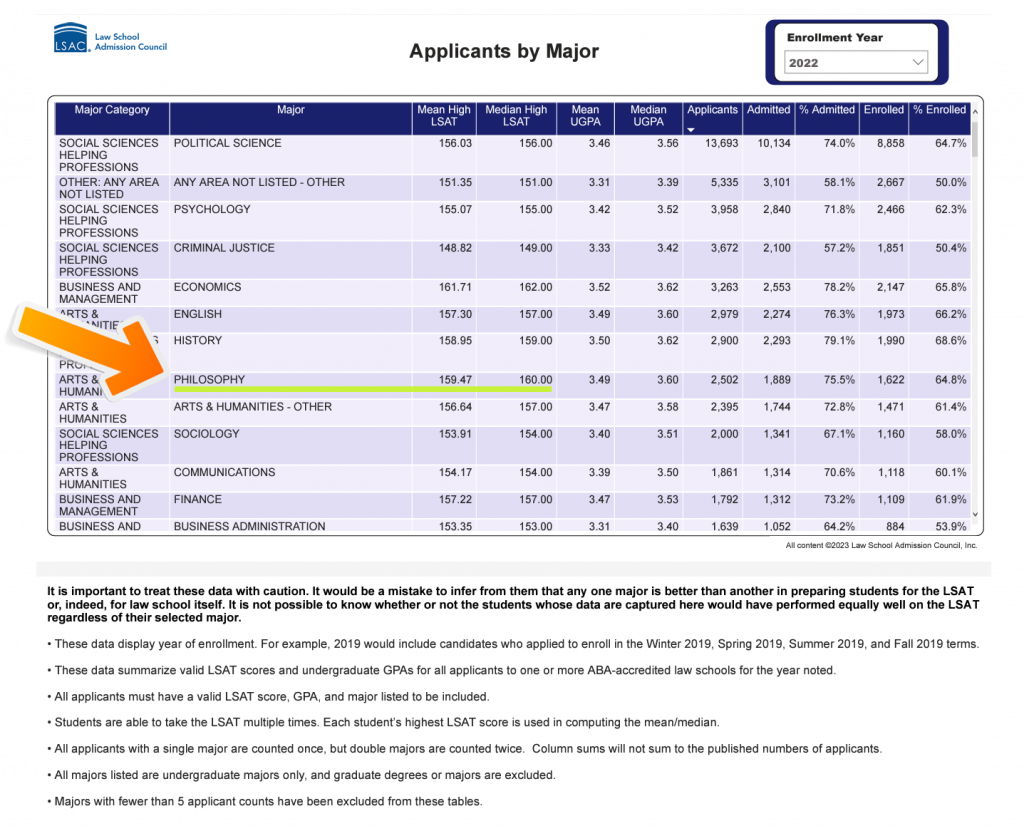
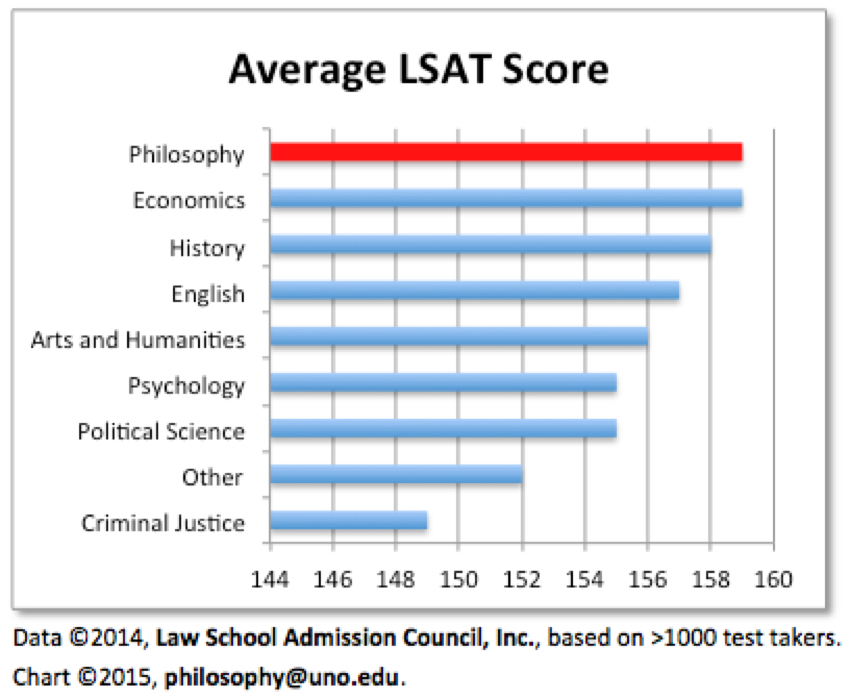
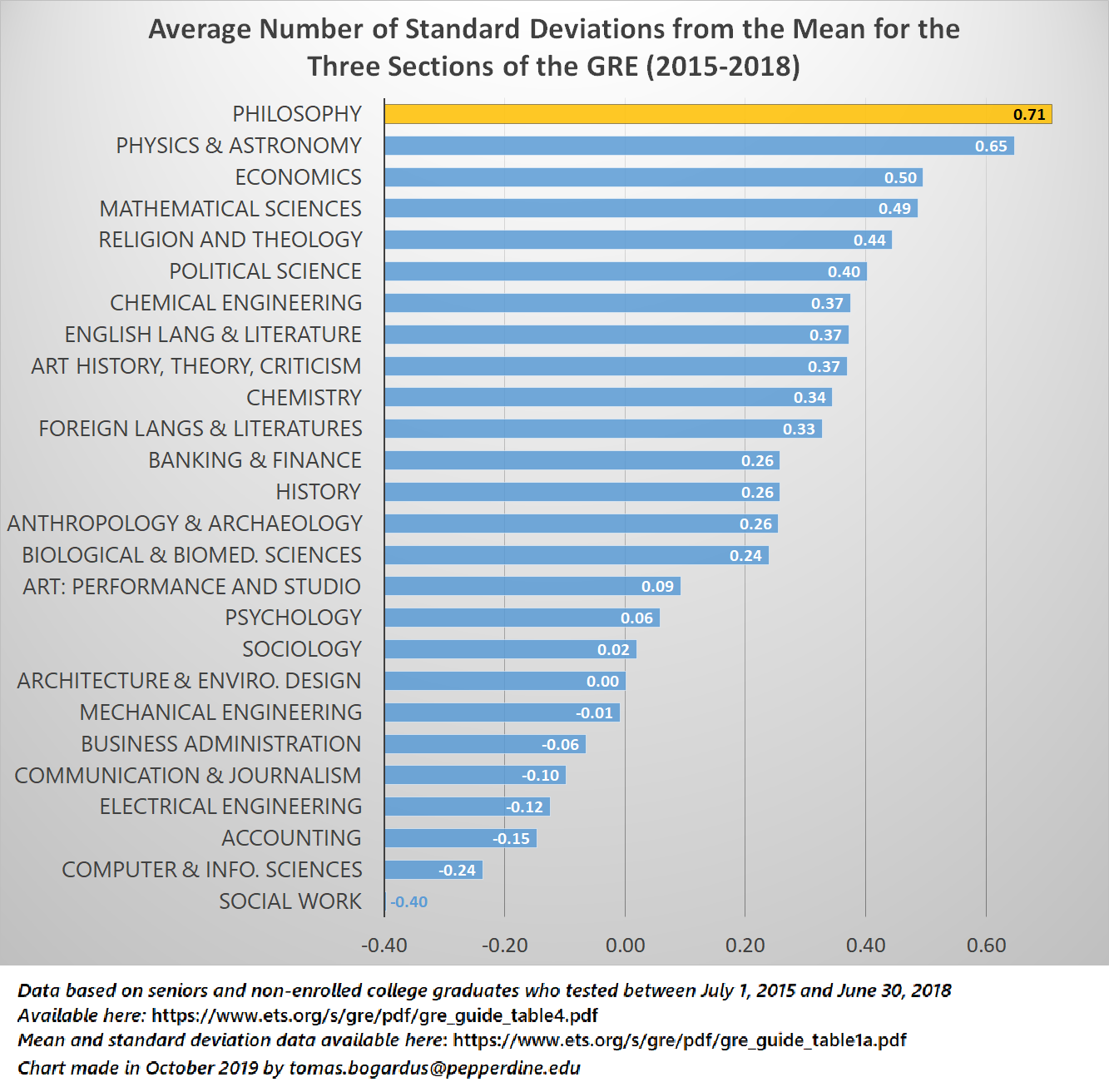
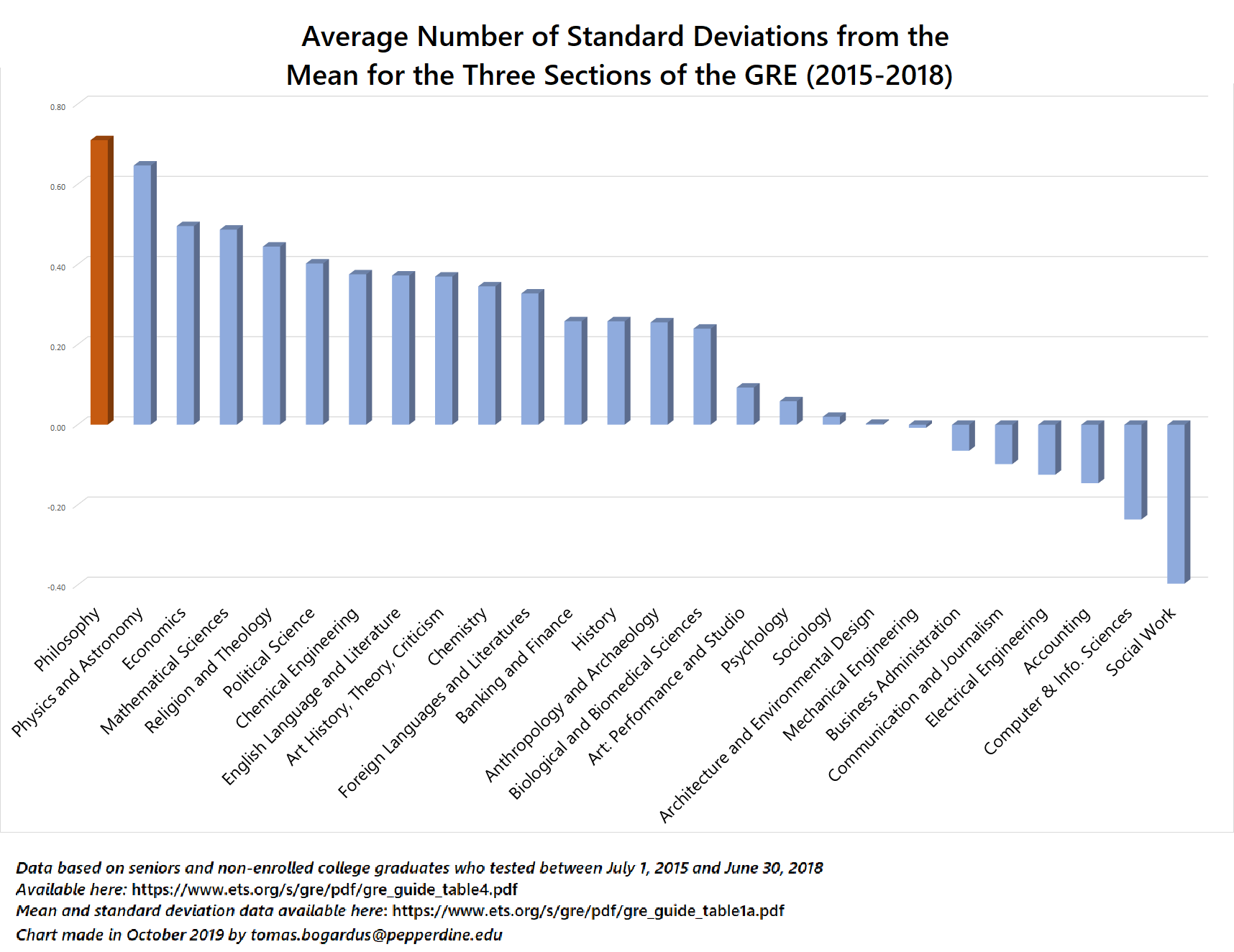

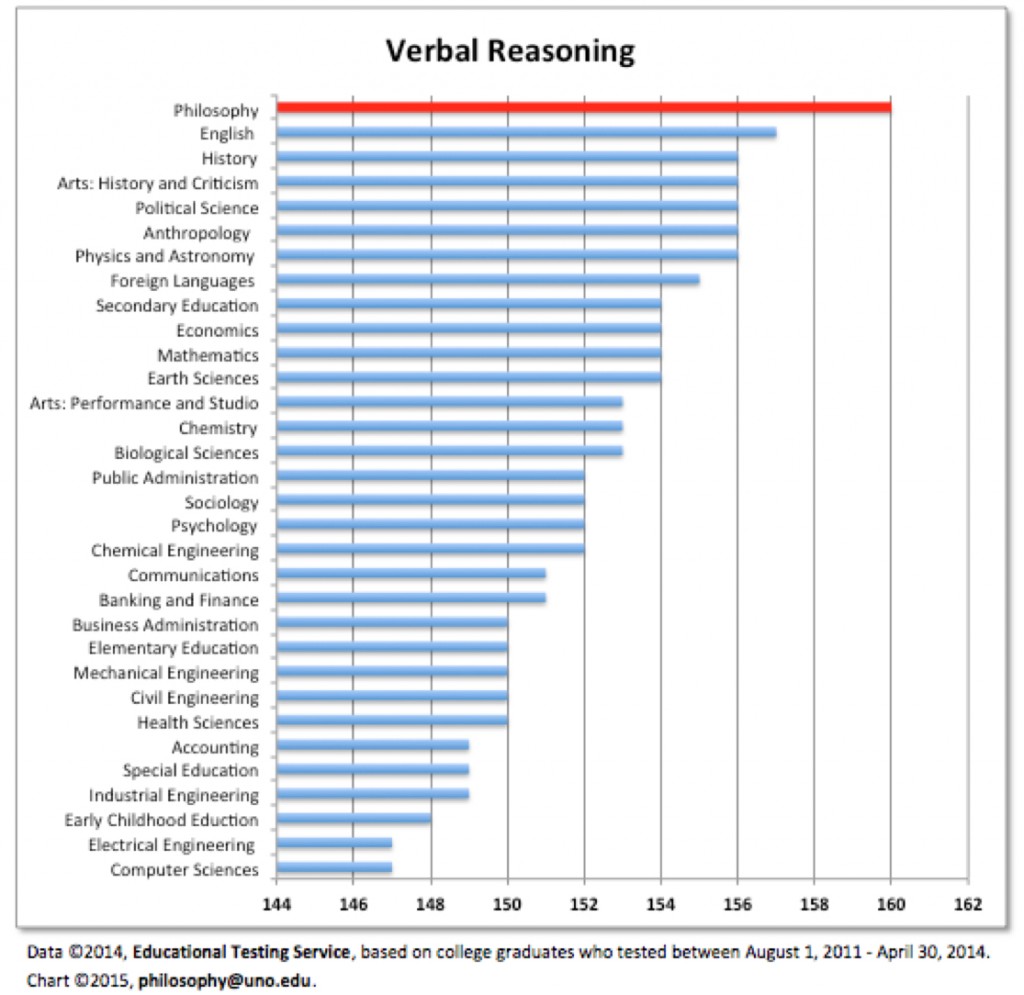
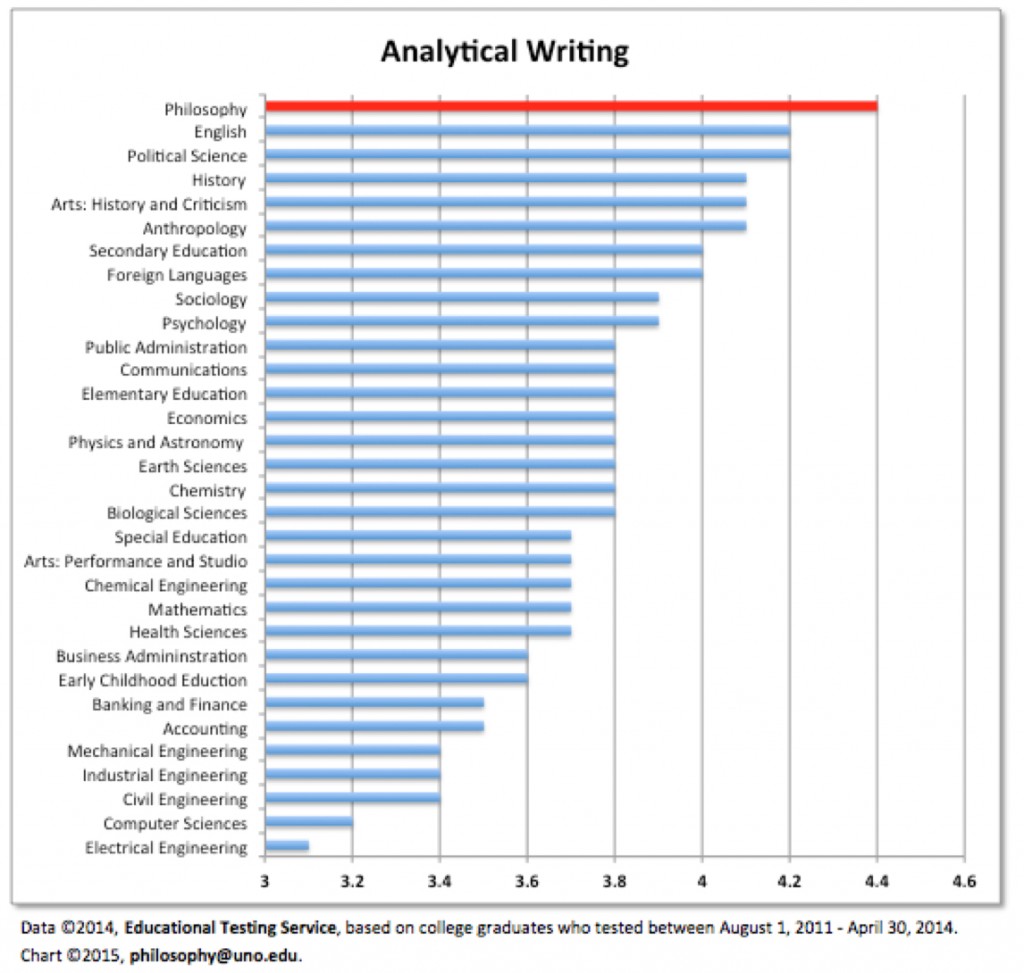
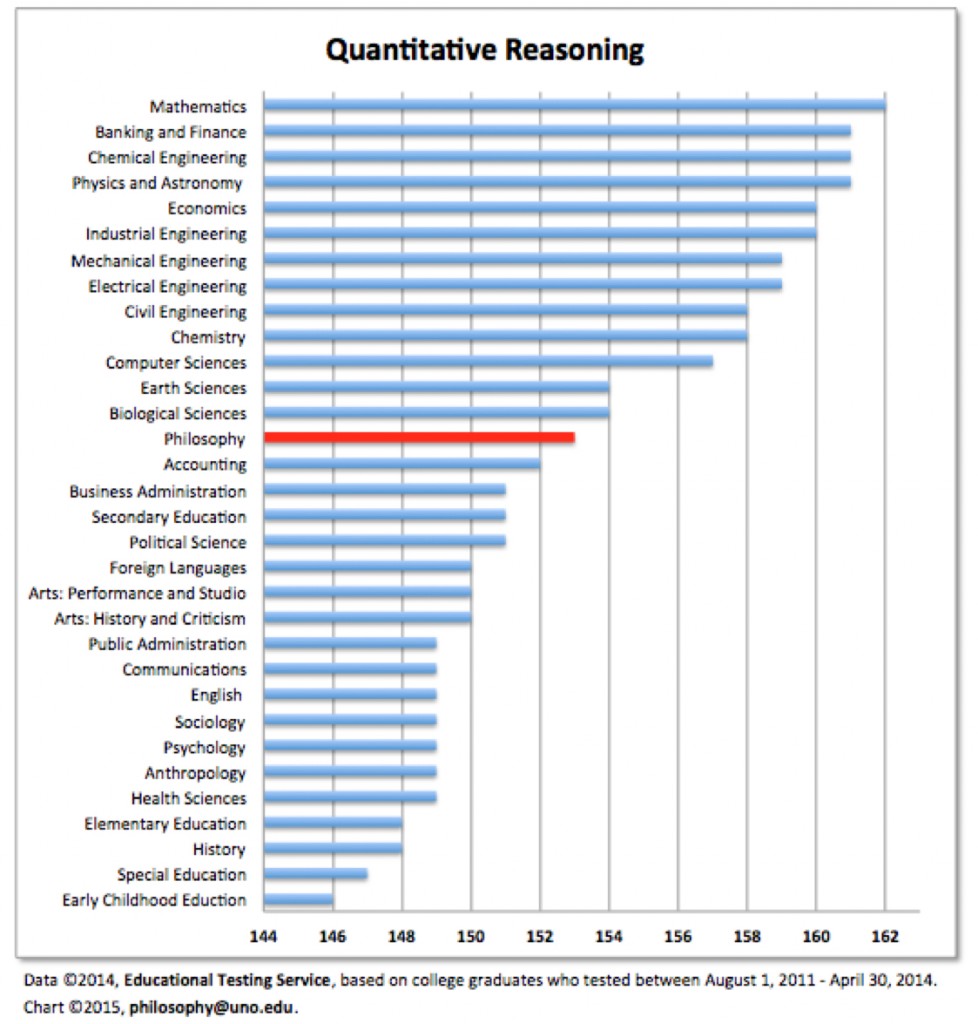
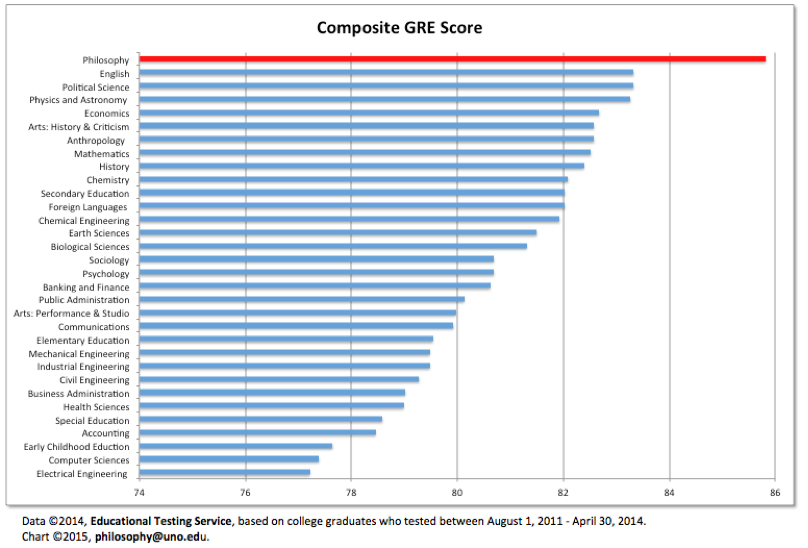
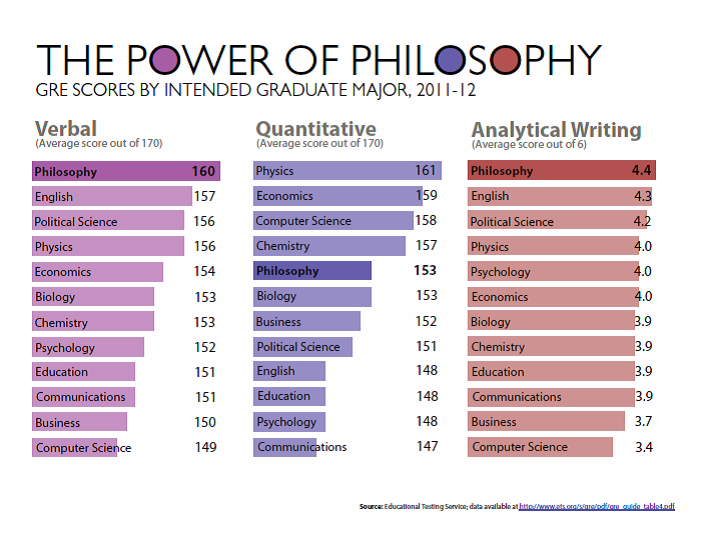
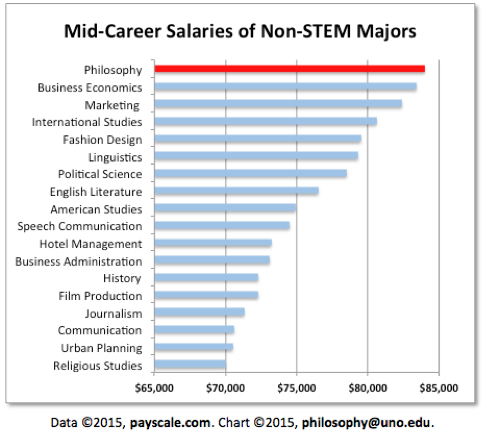
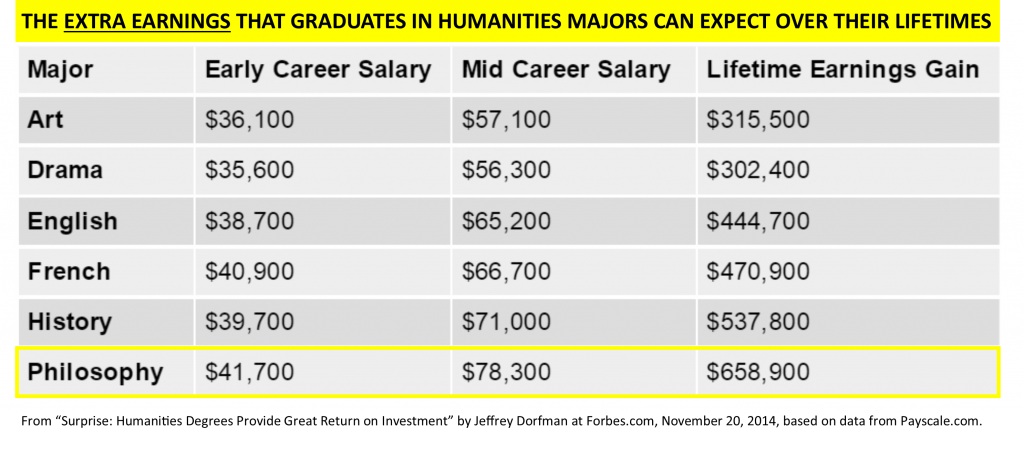
Just a couple of quick points:
1. If the GRE results here are the same ones I’ve seen posted on other sites, it should be noted that they are categorized by intended graduate area of study rather than by undergraduate major. Its still a very impressive indicator for philosophy students, who make up the bulk of students applying for philosophy graduate programs; but I don’t think ETS releases scores by undergraduate major.
2. On the table from the Forbes article, the introductory phrase “Compared to other humanities” might lead one to believe that the Lifetime Earnings Gain reported is relative to some average of humanities majors. The Lifetime Gain column in this graph represents instead the difference in lifetime earnings between a graduate of that major and a high school graduate. Again, philosophy is still very impressive on this score, but just wanted to clarify the point of comparison.
Right on GRE categorization. But, while there is not good (or maybe no) data on the actual breakdown, it seems very unlikely that someone would be taking GRE with philosophy as intended area of study who had not studied philosophy, either as a major, a double-major, a minor, or even as the student who took a lot of philosophy but was just shy of declaring it as a second major. Philosophy majors often declare “late” in their undergraduate career, because they sometimes don’t find it until they take some general education course, and then realize that they like it and are good at it. In the sciences, it would be very hard to start a science major relatively late. Thus the students who take GREs intending to pursue graduate study in physics are almost certainly physics majors. However, the student going on to study philosophy at the graduate level may not have officially declared or graduated with a philosophy major, or they may have graduated with it as a second major and that might not show up in a lot of the official statistics on undergraduate majors. (For example, I believe that a lot of the NCES data reports one student/one major, so that there is not double-counting of students. I know at my institution, philosophy is often the second chosen major, and is not listed as the “primary” major. In fact, even in some of our internal reporting the second majors were not getting counted at all, which was seriously under-reporting the strength of the philosophy major. We have now fixed that, so that we have much better internal data, and that has been important for resource allocation.)
Anyway, my general point is that it seems quite improbable that someone would intend to pursue graduate study in philosophy without having studied it in a substantial way at the undergraduate level. In that sense, the GRE is probably a pretty good selector for “philosophy students” even if not always “philosophy majors.”
Hey Justin, would you mind posting the links to where you got this data? Thanks in advance!
Link to an excel file for the Forbes earning data, so you can format your chart as you wish: https://drive.google.com/file/d/0B2Qb_8pU4arocVZLMVN2X0FETU0/view?usp=sharing
If you could post a link to the other data, that would be nice: I’d like the option to format these charts!
Selection or treatment effect?
I think it is very important to have this point in mind: the ability your major or your univirsity degree gives to u, must be a kind of usefull one. Everybody who studies philosophy as his or her official major, must choose his or her interests such that it covers something important in our modern world and society..it means we, as philosophy students or professional philosophers, must work on much more realistic and practical problems while making geniune philosophical reflections and analysis…we should solve public problems, whith our own special ways and technics
Philosophy is the reference point in what we do. Whichever field that you study must be attached to philosophy.
Hi, great set of charts and information.
I just have a question regarding this oft-cited statistic (so nicely summarized in your chart) that shows that Philosophy graduates earn more than those in other humanities disciplines. (As shown here, it is ranked roughly, 1. Philosophy, 2. History, 3. Languages, 4. Drama and Art).
Now, looking at other statistics, it is intriguing to find that the Gender Distribution appears to mirror that ranking precisely, in this way: That there is a preponderance of males enrolled in undergraduate Philosophy (the highest of the Humanities discipline by a long shot), with the next highest percentage of males being in History, followed by a male minority and significant female majority in Languages, and a more significant female majority in the Fine Arts.
As we are all also aware that Women on average take home less pay in their careers then men do (for reasons both of discrimination, well-documented, as well as the other sociological points of some women working less “manically” then men do (on average), and spending slightly more hours with family, etc.). —
As we are all aware of the statistics on men and women’s averages of pay, it leads me to wonder if the argument that “You will make more if you go into Philosophy!” Might be a little misleading?
I.e., if I am already a Male for instance, could it not be partly that why Philosophy appears to pay higher just be that there are more males who have graduated with Philosophy degrees? (and maybe the jobs they are now doing are closely related with their degrees — or maybe they are not, but either way because of the much higher percentage of males within that cohort, their average income is marginally higher, as would be the case in ANY cohort with a majority of males, as compared with a majority of Female earners, in our current society).
This question just occurs to me whenever I see this statistic. And apologies if this was a long-winded way of putting the question. But is there anything to this point? Or do you think the income discrepancy between Philosophy and History, and between History and Languages/Fine Arts, is significantly more than even that between such relative proportions of males/females in any sample group? (Maybe this is something I could look up myself through the data, but as you have expertise presumably in this area, would like to hear any feedback from others!)
Thanks a lot, Cheers
Just to follow up on my over-long first comment: I don’t think I have time to compute it all at the moment, but here are a few of the bits of potential data I guess:
The ratio of women’s and men’s median annual earnings was 78.6 percent for full-time/year-round workers in 2014. This means the gender wage gap for full-time/year-round workers is 21.4 percent. Women’s median annual earnings in 2014 were $39,621 compared with $50,383 for men.
Alright. So that is quite a significant gap — 21.4 % (!!) Far larger than the displayed gaps between graduates of the various humanities disciplines. But the question will remain what the Ratios of males to females who graduated those disciplines, are:
Philosophy:
(http://www.humanitiesindicators.org/content/indicatordoc.aspx?i=267)
In 2014, 31% of philosophy degree completers at the bachelors and doctorate levels were women, and 28% of master’s degree recipients were women (Indicator II-21g).
From 1987 to 2014, women’s share of bachelor’s degrees varied little, fluctuating in the 30–33% range.
History:
The share of women among history bachelor’s degree recipients peaked at almost 42% in 2004 but then fell gradually over the next decade to slightly below 40% in 2014 (Indicator II-19g).
English Language and Literature:
Women have received a majority of bachelor’s and master’s degrees in English since at least 1966. Women have accounted for two-thirds of the degree recipients at the master’s level since the early 1980s and at the bachelor’s level for as long as these data have been collected (Indicator II-18g).
So roughly these data points: Philosophy: 67 – 70% Men History: about 58 to 61% men
English: about 33% men.
Not sure if I’m awake enough at this time at night to try to compute this right (prepare to mock my failed math), but let me give it a brief shot:
IF THE SALARIES WERE JUST EQUAL TO THE AVERAGE FOR MEN AND WOMEN IN A TYPICAL POPULATION:
Let’s put Philosophy at 68.5% men, in the middle of the range. 0.685 * 50,383 = 34,512. Women: 31.5%: So: 0.315 * 39,621 = 12,480
34,512 + 12,480 = 46,992 So if my calculations are correct (and that is an IF, I know, right?), It would appear that an average population with these percentages of men and women would earn 46,992
What does Philosophy earn? The chart tells us, 41,700 for early career, and significantly more (78,300) for later career. But let’s look at the other disciplines:
OK — its too late at night and I’m just eyeballing it. I don’t have time to do History at the moment. But the eyeball check suggests History might be marginally better off than Philosophy when these gender disparities are taken into account. But maybe not. Maybe roughly comparable. That would still suggest that the data is not overwhelmingly strong that Philosophy is a better bet than History for a higher salary.
But let’s look at English:
OK, I’ll try to finish this up tomorrow. Thanks for reading if you got this far, Cheers. (And I’m aware I’ve probably reinvented the wheel here (or some much less useful invention), as someone has I’m sure computed this data before. But as I said, it’s late, and I was interested to see).
Best wishes, – M
English: 33% men; 67% women.
Average Salary for that proportion of men and women in a random sample of population:
0.670 * 39,621 = 26,546
0.330 * 50,383 = 16,626
(clunky calculations)
(result)
26,546 + 16,626 = 43,172
So. For a random sample of men and women in the proportion of men and women that graduate with Philosophy degrees, we get: salary of 46,992
For a random sample of men and women in the proportion of genders that graduate with English degrees, we get: Salary of 43,172.
Difference of: $3,820 per year.
OK, let’s see what the chart holds:
Early career is Philosophy 41,700, English 38,700. Difference of only $3,000 per year.
So according to this data, for “Early Career,” at least, once you adjust for the gender imbalance, it MAY BE BETTER for AN INDIVIDUAL MAN OR WOMAN to go into ENGLISH THAN PHILOSOPHY, (if they want to earn an extra paltry $800 per year).
The difference is minimal, but it does suggest that the two are comparable in this “Early career” data, and that the apparent advantage to Philosophy for that data point, may be rather specious?
That said, the difference does get more substantial for “Late career” (however on earth that is defined), and “Lifetime earnings,” So perhaps for those the argument is borne out that Philosophy earns an average person, men or woman, more than an English degree.
Maybe I’ll have to work out the full details later. Thanks for following along. And thanks for providing this data in the first place, interesting stuff.
One issue I’ve often thought about with stats like these is that sometimes philosophy professors will use them to argue that they provide evidence that “philosophy teaches students how to do critical thinking well.” However, an alternate explanation is that students who are already good at critical thinking are often drawn to disciplines like philosophy.
Thanks–Bill Cooney
The LSAT chart, like many others on the internet, is misleading because it omits many majors that outranked philosophy and economics in 2014-15. (The chart also makes it look like philosophy outranked economics, even though economics had a slightly higher mean than philosophy.) The full results for 2014-2015 are here: https://www.lsac.org/data-research/data/applicants-major. (You will need to open the Excel file and sort highest to lowest “Mean LSAT.”)
1. Astronomy — 165.83
2. Statistics — 162.33
3. Physics, General — 162.02
4. Biophysics — 162.00
5. Mathematics — 160.99
6. Linguistics — 160.71
7. Bio/Biomedical — 160.50
8. Classics — 160.45
9. American Civilization — 159.48
10. Russian — 159.47
11. Industrial Relations — 159.29
12. Economics — 158.99
13. Policy Studies — 158.78
14. Engineering — Other 158.70
15. Biochemistry — 158.56
16. Physics, Specialization — 158.56
17. Aerospace and Aeronautical — 158.26
18. Petroleum Engineering — 158.25
19. Art History — 158.17
20. Philosophy — 158.05
…
Disregard my previous message. I noticed that the graph says “based on more than 1,000 students,” in which case economic sand philosophy are indeed ranked the highest that year (although economics still slightly outranked philosophy).
This chart is still important though. So philosophy is really only on top based on excluding a wide range of majors?! I had no idea.
This is a foolish exercise. The GMAT is comparable to the SAT in difficulty; so if you study philosophy for reaching a high-school level of mastery, you have bigger problems and should try a more practical approach regardless. The LSAT operates on classical logic, so the real value of philosophy of logic and metalogic vanishes by emphasizing fluency in one system without questioning. The GRE, post-2011, removed analogical thinking thereby removing also the need for understanding relations between words, possibly the most important understanding one gains from studying philosophy. I’m not against good technocrats but bad ones like these graphs demonstrate.
For reference regarding the GRE: https://crunchprep.com/gre/gre-test-format